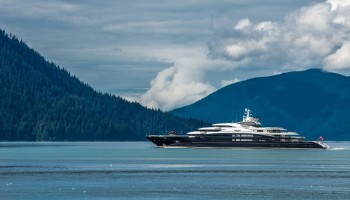A trove of 13.4 million records exposes ties between Russia and U.S. President Donald Trump’s billionaire commerce secretary, the secret dealings of Canadian Prime Minister Justin Trudeau’s chief fundraiser and the offshore interests of the queen of England and more than 120 politicians around the world.
The leaked documents show how deeply the offshore financial system is entangled with the overlapping worlds of political players, private wealth and corporate giants, including Apple, Nike, Uber and other global companies that avoid taxes through increasingly imaginative bookkeeping maneuvers.
One offshore web leads to Trump’s commerce secretary, private equity tycoon Wilbur Ross, who has a stake in a shipping company that has received more than $68 million in revenue since 2014 from a Russian energy company co-owned by the son-in-law of Russian President Vladimir Putin.
In all, the offshore ties of more than a dozen Trump advisers, Cabinet members and major donors appear in the leaked data.
The new files come from two offshore services firms, based in Bermuda and Singapore, as well as from 19 corporate registries maintained by governments in jurisdictions that serve as waystations in the global shadow economy. The leaks were obtained by German newspaper Süddeutsche Zeitung and shared with the International Consortium of Investigative Journalists and a network of more than 380 journalists in 67 countries.
The promise of tax havens is secrecy – offshore locales facilitate the creation of companies that will be difficult, or impossible, to trace back to their owners. While having an offshore entity is often legal, the built-in secrecy attracts money launderers, drug traffickers, kleptocrats and others who want to operate in the shadows. Offshore companies, often a “shell” with no employees or office space, are also used in complex tax avoidance structures that drain billions from national treasuries.
The offshore industry makes “the poor poorer” and is “deepening wealth inequality,” said Brooke Harrington, a certified wealth manager and Copenhagen Business School professor who is the author of “Capital without Borders: Wealth Managers and the One Percent.”
“There is this small group of people who are not equally subject to the laws as the rest of us, and that’s on purpose,” Harrington said. These people “live the dream” of enjoying “the benefits of society without being subject to any of its constraints.”
The records significantly expand on the revelations from the leak of offshore documents that spawned the 2016 Panama Papers investigation by ICIJ and its media partners. The new files shine a light on a different cast of underexplored island havens, including some with cleaner reputations and higher price tags, such as the Cayman Islands and Bermuda.
The most detailed revelations emerge in decades of corporate records from the white-shoe offshore law firm Appleby and corporate services provider Estera, two businesses that operated together under the Appleby name until Estera became independent in 2016.
At least 31,000 of the individual and corporate clients included in Appleby’s records are U.S. citizens or have U.S. addresses, more than from any other country. Appleby also counted clients from the United Kingdom, China and Canada among its biggest sources of business.
Nearly 7 million records from Appleby and affiliates cover the period from 1950 to 2016 and include emails, billion-dollar loan agreements and bank statements involving at least 25,000 entities connected to people in 180 countries. Appleby is a member of the “Offshore Magic Circle,” an informal clique of the planet’s leading offshore law practices. The firm is headquartered in Bermuda and has offices in Hong Kong, Shanghai, the British Virgin Islands, the Cayman Islands and other offshore centers.
Appleby has a well-guarded 100-year reputation and has avoided public scrapes through a mixture of discretion and expensive client monitoring.
In contrast to Appleby’s public image, the files reveal a company that has provided services to risky clients from Iran, Russia and Libya, failed government audits that identified gaps in anti-money-laundering procedures and been fined in secret by the Bermuda financial regulator. Appleby did not reply to ICIJ’s detailed questions but released an online statement stating it had investigated ICIJ’s questions and is “satisfied that there is no evidence of any wrongdoing.”
The firm said it is “subject to frequent regulatory checks and we are committed to achieving the high standards set by our regulators.”
The leaked cache of documents includes more than half a million files from Asiaciti Trust, a family-run offshore specialist that is headquartered in Singapore and has satellite offices from Samoa in the South Pacific to Nevis in the Caribbean.
The leaked files also include documents from government business registries in some of the world’s most secretive tax havens, in the Caribbean, the Pacific and Europe, such as Antigua and Barbuda, the Cook Islands and Malta. One-fifth of the world’s busiest secrecy jurisdictions are represented in these databases.
Taken as a whole, the leaks reveal offshore traces of spy planes purchased by the United Arab Emirates, the Barbados explosives company of a Canadian engineer who tried to build a “super gun” for Iraqi dictator Saddam Hussein and the Bermuda company of the late Marcial Maciel Degollado, the influential Mexican priest and founder of the Catholic religious order the Legionaries of Christ, whose legacy was marred by allegations of child sexual abuse.
Queen Elizabeth II has invested millions of dollars in medical and consumer loan companies, Appleby’s files show. While the Queen’s personal estate, the Duchy of Lancaster, provides some details of its investments in U.K. property, such as commercial buildings scattered across southern England, it has never disclosed details of its offshore investments.
The records show that as of 2007, the queen’s personal estate invested in a Cayman Islands fund that in turn invested in a private equity company that controlled BrightHouse, a U.K. rent-to-own firm criticized by consumer watchdogs and members of Parliament for selling household goods to cash-strapped Britons on payment plans with interest rates as high as 99.9 percent.
Other royals and politicians with newly disclosed offshore ties include Queen Noor of Jordan, who was listed as the beneficiary of two trusts on the island of Jersey, including one that held her sprawling British estate; Sam Kutesa, Uganda’s foreign minister and a former U.N. General Assembly president, who set up an offshore trust in the Seychelles to manage his personal wealth; Brazil’s finance minister, Henrique de Campos Meirelles, who created a foundation in Bermuda “for charitable purposes”; and Antanas Guoga, a Lithuanian member of the European Parliament and professional poker player, who held a stake in an Isle of Man company whose other shareholders included a gambling mogul who settled a fraud lawsuit in the United States.
Wesley Clark, a one-time Democratic presidential hopeful and a retired four-star U.S. Army general who served as NATO’s supreme commander in Europe , was a director of an online gambling company with offshore subsidiaries, the files show.
A spokesman for Queen Elizabeth II told ICIJ partner The Guardian that the Duchy has an ongoing investment in the Cayman Island fund and was not aware of the investment in BrightHouse. The Queen voluntarily pays tax on income from the Duchy and its investments, the spokesman said.
Queen Noor told ICIJ that “all the bequests made to her and to her children by [the late King Hussein] have always been administered according to the highest ethical, legal and regulatory standards.” Brazil’s Meirelles said the foundation he created does not benefit him personally and will support education charities after his death.
Guoga said he declared his investment in the Isle of Man company to authorities and sold the last of his shares in 2014.
"I thought you could avoid, not evade, taxes but I found it was not practical,” Kutesa told ICIJ’s media partner The Daily Monitor. He said he did nothing with the companies. “I told Appleby to close it many years ago.”
Kutesa and Clark did not reply to requests for comment.
In addition to disclosures about politicians and corporations, the files reveal details about the financial lives of the rich and famous – and the completely unknown. They include Microsoft co-founder Paul Allen’s yacht and submarines, eBay founder Pierre Omidyar’s Cayman Island investment vehicle, and Madonna’s shares in a medical supplies company. Pop singer and social justice activist Bono – listed under his full name, Paul Hewson – owned shares in a company registered in Malta that invested in shopping center in Lithuania, company records show. Other, less famous clients, listed their occupations as dog groomer, plumber and wakeboard instructor.
Madonna and Allen did not reply to requests for comment. Omidyar, whose Omidyar Network donates to ICIJ, discloses his investment to the IRS, a spokeswoman said. Bono was a “passive, minority investor” in the Malta company that closed down in 2015, a spokeswoman said.
Trudeau and Trump
Wealthy people across the political spectrum use the offshore system.
The files reveal that Stephen Bronfman, Canadian Prime Minister Trudeau’s adviser and close friend, teamed up with Leo Kolber, another Liberal Party stalwart and former member of Canada’s Senate, and Kolber’s son to quietly move millions of dollars to a Cayman trust. The offshore maneuvers may have avoided taxes in Canada, the United States and Israel, according to experts who reviewed some of the 3,000-plus files detailing the trust’s activities.
As the offshore riches grew, lawyers for Bronfman, the Kolbers and other wealthy interests lobbied Canada’s Parliament to fight legislative proposals to tax income from offshore trusts.
Bronfman remains a key fundraiser for Trudeau, who has championed openness in government and promised a crackdown on offshore tax dodging. In September, Trudeau told the U.N. General Assembly: “Right now, we have a system that encourages wealthy Canadians to use private corporations to pay a lower tax rate than middle-class Canadians. That’s not fair and we’re going to fix it.”
Kolber’s lawyers said in a letter to ICIJ’s partner CBC that “none of the transactions or entities at issue were effected or established to evade or even avoid taxation.” They added that the trusts “were always in full conformity with all applicable laws and requirements,” and said that no further comment would be provided by Stephen Bronfman.
In the United States, the files reveal foreign business ties and personal wealth practices of key Trump associates who are charged with helping to put “America First.”
The Appleby files show how Ross, Trump’s commerce secretary, has used a chain of Cayman Islands entities to maintain a financial stake in Navigator Holdings, a shipping company whose top clients include the Kremlin-linked energy firm Sibur. Among Sibur’s key owners are Kirill Shamalov, Russian President Putin’s son-in-law, and Gennady Timchenko, a billionaire the U.S. government sanctioned in 2014 because of his links to Putin. Sibur is a major customer of Navigator, paying the company more than $23 million in 2016.
When he joined Trump’s Cabinet, Ross divested his interests in 80 companies. But he kept stakes in nine companies, including the four that connect him to Navigator and its Russian clients.
These revelations come against a backdrop of growing concerns about hidden Russian involvement in U.S. political affairs.
Sibur is “a company with crony connections,” said Daniel Fried, a Russia expert who has served in senior State Department posts in both Republican and Democratic administrations. “Why would any officer of the U.S. government have any relationship with a Putin crony?”
A spokesman for Ross said that the Commerce Secretary never met Putin’s son-in-law or Sibur’s other owners and that he was not on the board of Navigator when it initiated its relationship with Sibur.
Ross recuses himself from matters that relate to international shipping, his spokesman said, and “has been generally supportive of the administration’s sanctions” against Russian entities.
The leaked files also led to other discoveries about U.S.-Russian business ties.
A document in the new cache of records helped steer ICIJ and its media partners to public documents and Panama Papers files that illuminate links between a pair of Kremlin-owned financial firms and major investments in Twitter and Facebook.
In 2011, the investment fund run by tech mogul Yuri Milner received $191 million from one of the Russian government firms, VTB Bank, and quietly invested that money in Twitter. Documents also show that a financial subsidiary of the Kremlin-controlled energy giant Gazprom funded a shell company that invested in a Milner-affiliated company that held roughly $1 billion in Facebook shares shortly before the social network’s 2012 initial public offering.
More recently, Milner invested $850,000 in Cadre, a real estate firm co-founded by Trump’s son-in-law and White House adviser, Jared Kushner.
Milner is a Russian citizen who lives in Silicon Valley. His ties to Twitter, Facebook and Kushner’s firm have been previously disclosed. But his links to the Kremlin financial institutions weren’t previously known.
VTB confirmed that it had used Milner’s fund to make an investment in Twitter. Facebook and Twitter said they had properly reviewed Milner’s investments.
In an interview Milner said he was unaware of any possible involvement by the Gazprom subsidiary in any of his deals and that none of his many investments have been related to politics. He said he used his own money in the Kushner investment.
On the other side of the U.S. political divide, Ross’ predecessor as secretary of commerce, Penny Pritzker, pledged to sell investments to avoid conflicts of interest after she assumed her post in Democratic President Barack Obama’s Cabinet. The files show that soon after she received Senate confirmation in June 2013, Pritzker transferred her interests in two Bermuda companies to a firm that used the same mailing address as her private investment firm in Chicago. The company also was “owned by trusts that are for the benefit of Penny Pritzker's children,” according to Appleby’s files. These transfers may have fallen short of federal ethics standards for divestment, according to ethics expert Lawrence Noble.
Republican and Democratic donors alike appear in offshore records, including Randal Quarles, a GOP-leaning donor and the new Wall Street watchdog at the Federal Reserve. Quarles was an officer of two Cayman Island companies, including one that was involved in a loan deal with a Bermudan bank, N.T. Butterfield & Son. Until recently, Quarles held an indirect interest in the bank, which is under investigation by U.S. authorities for possible tax evasion by its American account holders. Private equity funds controlled by Democratic mega-donor George Soros, a hedge fund billionaire, use Appleby to help manage a web of offshore entities, including an investment in one company engaged in reinsurance, or insurance for insurers. His charitable organization, the Open Society Foundations, is a donor to ICIJ.
A spokesperson at the Federal Reserve said Quarles divested his indirect interest in the Bermudan bank after he was confirmed for the government post. Soros declined to comment, and Pritzker did not respond to requests for comment.
Boardroom Secrets
When Appleby is not serving the interests of some of the world’s wealthiest individuals, it provides nuts-and-bolts legal help to corporations that seek to reduce their taxes in the countries where they do business. Appleby is not a tax adviser, but the firm plays a role in tax programs used by companies across the world.
In addition to top-flight international banks such as Barclays, Goldman Sachs and BNP Paribas, other elite Appleby clients include the founder of one of the Middle East’s largest construction conglomerates, the Saad Group, and the Japanese company operating the crippled nuclear power plant in Fukushima.
The files reveal that America’s most profitable company, Apple Inc., shopped around Europe and the Caribbean for a new island tax shelter after a U.S. Senate inquiry found that the tech giant had avoided tens of billions of dollars in taxes by shifting profits into Irish subsidiaries.
In one email exchange, Apple’s lawyers asked Appleby to confirm that a possible move to one of six offshore tax havens would allow an Irish subsidiary to “conduct management activities . . . without being subject to taxation in these jurisdictions.” Apple declined to comment on details of the corporate reorganization, but told ICIJ that it explained the new arrangements to government authorities and that the changes did not reduce its tax payments.
The files also reveal how big corporations cut their taxes by creating offshore shell companies to hold intangible assets such as the design of Nike’s “Swoosh” logo and the creative rights to silicone breast implants.
One of Appleby’s top corporate clients was Glencore, the world’s largest commodity trader. The files contain decades of deals, emails and multimillion-dollar loans to bankroll ventures in Russia, Latin America, Africa and Australia.
Glencore was such an important client that it once had its own room within Appleby’s offices in Bermuda.
Company board meeting minutes document how Glencore representatives leaned on Daniel Gertler, an Israeli businessman with high-level friends in the Democratic Republic of the Congo, to help seal a deal for a valuable copper mine. Glencore lent millions to a company, widely believed to belong to Gertler, described in a U.S. Department of Justice inquiry as a conduit for bribes. Gertler and Glencore were not named in the case.
Glencore said its background checks on Gertler were “extensive and thorough.” The Justice Department investigation “does not constitute evidence of anything against Mr. Gertler,” his lawyers said, adding that he “rejects absolutely any allegations of wrongdoing or criminality by him.” No loans were used improperly or for inappropriate purposes, Gertler's lawyers said.
Offshore Operatives
The offshore industry is a globe-circling labyrinth of accountants, bankers, money managers, lawyers and middlemen who get paid to serve the interests of the rich and well-connected.
Appleby, for example, is one link in a chain of offshore actors who helped sports stars, Russian oligarchs and government officials to purchase jets, yachts and other luxury items. The offshore experts helped Arkady and Boris Rotenberg, two Russian billionaires and childhood friends of President Putin, buy jets worth more than $20 million in 2013. U.S authorities blacklisted the Rotenbergs in 2014 for their support of “Putin’s pet projects” and for having banked “high price contracts” through the Russian government. Appleby cut its ties with the brothers but, in one case, received approval from the Isle of Man government nearly two years after sanctions were imposed to disburse fees to keep one of the brothers’ companies on the business register. The Rotenbergs did not reply to Süddeutsche Zeitung’s requests for comment.
Clients prize Appleby for its expertise, efficiency and global network of professionals. Its peers repeatedly crown it Offshore Law Firm of the Year.
But decades of private documents also show that even one of the offshore industry’s brightest stars has hidden shortcomings: accepting questionable clients and failing to monitor multimillion-dollar money flows.
Bermuda financial regulators fined the firm’s trust unit for breaching anti-money-laundering rules, according to a confidential 2015 deal struck by Appleby and the regulator. This year, Appleby settled for $12.7 million a lawsuit in Canada in which nurses, firefighters and police officers accused the firm of unquestioningly circulating money on behalf of a client who designed an alleged tax avoidance scheme. Appleby and the alleged mastermind did not admit wrongdoing.
PowerPoint presentations prepared internally by an Appleby employee and other documents cite examples of unsavory characters who made their way onto the law firm’s client list, including a corrupt Pakistani official, two children of the infamous Indonesian dictator Suharto and an alleged “blood diamond” dealer. In some cases, Appleby quickly reported its suspicions about clients’ activities to authorities, as required by law. In other cases, questionable clients went unremarked for years.
Family-owned Asiaciti advertises itself as helping clients to accumulate and “preserve wealth from the ravages of litigation,” political upheavals and family breakups. It has attracted Chinese millionaires, family members of a Kazakh official convicted of corruption and a broad swath of Americans, including doctors, poker players and a Colorado alfalfa farmer.
The leaked files from Asiaciti reveal how the firm set up trusts in the Cook Islands for Kevin Trudeau, a U.S. infomercial frontman who sold millions of copies of self-help books such as “The Weight-Loss Cure ‘They’ Don't Want You to Know About.” In 2014, a Chicago judge sentenced Trudeau to 10 years in federal prison for criminal contempt, calling him a shameless fraudster who was “deceitful to the core” and once even used his mother’s Social Security number in one of his scams.
Appleby said in its online statement that it is committed to meeting regulators’ standards. Appleby provides advice to clients “on legitimate and lawful ways to conduct their business,” the firm said, and it does not tolerate illegal behavior.
“It is true that we are not infallible,” Appleby said. “Where we find that mistakes have happened we act quickly to put things right.”
Asiaciti did not respond to requests for comment.
Adrian Alhassan, a former compliance manager at Appleby’s Bermuda headquarters told ICIJ that if someone is “hellbent” on breaking the law, there’s only so much an offshore services provider can do. “It’s not the FBI,” he said. If the law firm spent years doing background research on clients, it wouldn’t “get any work done.”
“It’s like cleaning a beach,” Alhassan said in a telephone interview. “If you say that you’ve cleaned it up, at the end of the day, can you really say that you’ve picked up every piece of seaweed?”

Deepening Inequality
Tax havens’ secrecy laws entice those who wish to place their wealth and dealings beyond the reach of regulators, investigators and the tax collectors.
The documents from corporate registries in 19 such jurisdictions reveal company names and details, directors and real owners of companies created in many of the world’s busiest offshore hideouts.
The documents come from high- and low-profile bastions of financial secrecy such as Marshall Islands, Lebanon and St. Kitts and Nevis, a low-lying Caribbean country recently battered by hurricanes. Some jurisdictions’ records are publicly available but impossible to search by an individual’s name. Others, such as the Cayman Islands’ registry, charge more than $30 for a one-page record that provides only basic information. Six registries do not make information available online.
The leaked files contain more than a thousand records from Antigua and Barbuda, a Caribbean country that provides no online corporate information and more than 600,000 documents from the online registry of Barbados, which does not list shareholders or directors.
Over the past decade or more, the European Union and other international organizations have pressured offshore havens to reform their laws and require that offshore go-betweens aggressively screen clients. Progress has been slow, experts say, both because of the challenges of changing practices across a global web of jurisdictions, and because powerful people and big companies benefit from the offshore system.
They do so at the expense of the many – shifting the burden of taxation to middle-income taxpayers and giving multinational corporations an advantage over smaller competitors. Where it hurts most is in nations struggling to provide the basics for their populations.
In West Africa, Burkina Faso officials who monitor the tax payments of the largest companies doing business there work from cramped offices with broken air- conditioning units. Burkina Faso is among the poorest countries in the world. On average, a citizen there earns less annually than the owner of an offshore company in Bermuda pays in registration fees. The country’s tax office sought $29 million in unpaid taxes and penalties from Glencore, the world’s 16th-largest company and a major user of Appleby’s services. Glencore protested and the penalty was reduced to $1.5 million.
Helping the rich get richer through offshore maneuvers is not a “benign benefit,” said Harrington, the Copenhagen Business School professor. “When the rich get richer, the poor get poorer, because individual wealthy people are not paying their fair share of taxes.”
“It won’t be lost on wealth managers and those in the offshore industry,” she said, “that we are reaching sort of French Revolution levels of inequality and injustice.”
This story was reported and written by: Will Fitzgibbon, Michael Hudson, Marina Walker Guevara, Scilla Alecci, Richard H.P. Sia, Gerard Ryle, Emilia Diaz-Struck, Martha Hamilton, Simon Bowers, Hamish Boland-Rudder, Sasha Chavkin, Spencer Woodman, Ryan Chittum, Mar Cabra, Rigoberto Carvajal, Matt Caruana-Galizia, Cecile Schilis-Gallego, Pierre Romera, Julien Martin, Dean Starkman, Tom Stites, Manuel Villa, Amy Wilson-Chapman, Miguel Fiandor Gutiérrez, Yacouba Ladji Bama, Delphine Reuter, Petra Blum, Harvey Cashore, Frederik Obermaier, Bastian Obermayer, Vanessa Wormer, Hilary Osborne, Frédéric Zalac, Oliver Zihlmann.









